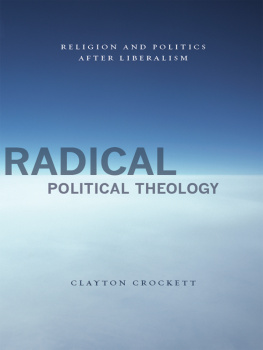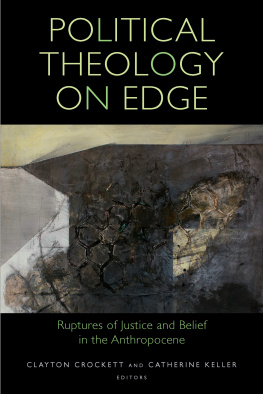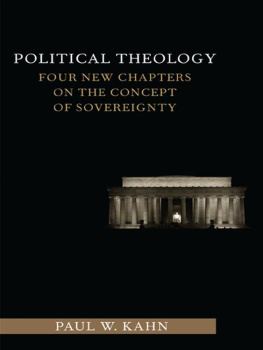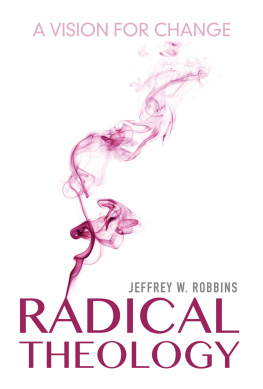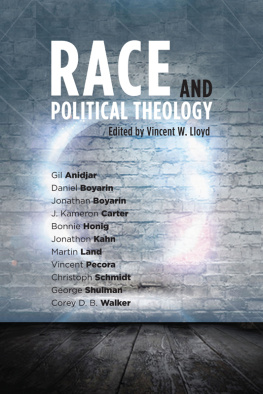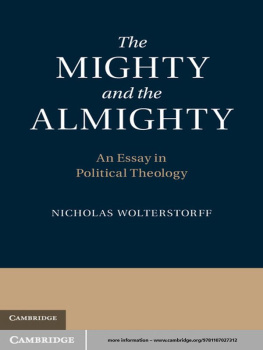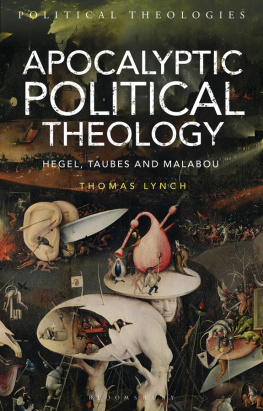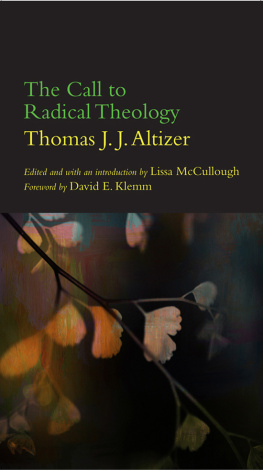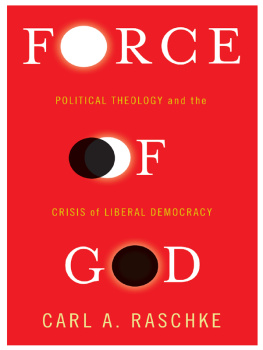INSURRECTIONS : CRITICAL STUDIES IN RELIGION, POLITICS , AND CULTURE
RADICAL
POLITICAL THEOLOGY
INSURRECTIONS: CRITICAL STUDIES IN RELIGION, POLITICS, AND CULTURE
SLAVOJ IEK, CLAYTON CROCKETT, CRESTON DAVIS, JEFFREY W. ROBBINS, EDITORS
The intersection of religion, politics, and culture is one of the most discussed areas in theory today. It also has the deepest and most wide-ranging impact on the world. Insurrections: Critical Studies in Religion, Politics, and Culture will bring the tools of philosophy and critical theory to the political implications of the religious turn. The series will address a range of religious traditions and political viewpoints in the United States, Europe, and other parts of the world. Without advocating any specific religious or theological stance, the series aims nonetheless to be faithful to the radical emancipatory potential of religion.
After the Death of God, John D. Caputo and Gianni Vattimo, edited by Jeffrey W. Robbins
The Politics of Postsecular Religion: Mourning Secular Futures, Ananda Abeysekara
Nietzsche and Levinas:After the Death of a Certain God, edited by Jill Stauffer and Bettina Bergo
Strange Wonder: The Closure of Metaphysics and the Opening of Awe, Mary-Jane Rubenstein
Religion and the Specter of the West: Sikhism, India, Postcoloniality, and the Politics of Translation,
Arvind Mandair
Plasticity at the Dusk of Writing: Dialectic, Destruction, Deconstruction, Catherine Malabou
Anatheism: Returning to God After God, Richard Kearney
Rage and Time: A Psychopolitical Investigation, Peter Sloterdijk
COLUMBIA UNIVERSITY PRESS NEW YORK
CLAYTON CROCKETT
RELIGION AND POLITICS AFTER LIBERALISM
RADICAL
POLITICAL THEOLOGY
COLUMBIA UNIVERSITY PRESS
PUBLISHERS SINCE 1893
NEW YORK CHICHESTER, WEST SUSSEX
cup.columbia.edu
Copyright 2011 Columbia University Press
All rights reserved
E-ISBN 978-0-231-52076-8
Library of Congress Cataloging-in-Publication Data
Crockett, Clayton, 1969
Radical political theology : religion and politics after liberalism / Clayton Crockett.
p. cm. (Insurrections)
Includes bibliographical references (p.) and index.
ISBN 978-0-231-14982-2 (cloth : alk. paper) ISBN 978-0-231-52076-8 (electronic)
1. Religion and politics. 2. Political theology. I. Title. II. Series.
BL65.P7C75 2011
201.72dc222010012341
A Columbia University Press E-book.
CUP would be pleased to hear about your reading experience with this e-book at .
References to Internet Web sites (URLs) were accurate at the time of writing.
Neither the author nor Columbia University Press is responsible
for URLs that may have expired or changed since the manuscript was prepared.
To my parents, Becky Crockett and Bill Crockett
CONTENTS
S OME OF THE MATERIAL FROM SECTION II OF THE INTRODUCTION IS drawn from my chapter Jeb Stuarts Revenge: The Civil War, the Religious Right, and American Fascism in The Sleeping Giant Has Awoken: The New Politics of Religion in the United States, ed. Jeffrey W. Robbins and Neal Magee (London: Continuum, 2008). Jeffrey W. Robbins coauthored an initial draft of is taken from my foreword to Catherine Malabou, Plasticity at the Dusk of Writing, trans. Carolyn Shread (New York: Columbia University Press, 2009). I want to particularly thank Malabou for her insights and conversation, and especially for her willingness to collaborate with me on an article that served as an earlier version of this chapter, Plasticity and the Future of Philosophy and Theology, published in a special issue of Political Theology (10, no. 4 [2009]), The Continental Shift, edited by Creston Davis.
Most of all, I would like to acknowledge and thank my coeditors and editors with Insurrections and Columbia University Press, Jeff Robbins, Creston Davis, Slavoj iek, Wendy Lochner, and Christine Mortlock for their support, encouragement, and camaraderie.
Next, I want to thank Catherine Keller, Ward Blanton, and Jeff Robbins for their care and commitment in reading the book manuscript and offering insightful and constructive feedback. Thanks to Danny Finer for compiling the indexsemper fi!
For all my friends and colleagues whose conversations and discussions helped me as I worked and thought through these issues, I am extremely grateful. In addition to those already named above, these include, but are not limited to: Nolle Vahanian, Catherine Malabou, Jack Caputo, Keith Putt, Sharon Baker, Michael Wilson, Natalie Zimmerman, Kevin Mequet, Sara Galvin, Mason Brothers, Sara Harvey, Mary-Ruth Marotte, Phillip Huddleston, Charlie Harvey, Jim Shelton, Peter Mehl, Jesse Butler, Julie Butler, Philip Good-child, Bob Spivey, Oz Lorentzen, Malik Saafir, Aaron Simmons, Jay McDaniel, the late Edith Wyschogrod, Thomas Altizer, Lissa McCullough, Charles Long, Gavin Hyman, Santiago Zabala, Mary-Jane Rubenstein, Ludger Viefhues, David Loy, Danny Finer, Wilson Dickinson, Jeremy Vecchi, Francis Sanzaro, Dan Miller, Craig Martin, Andrew Saldino, David Miller, Alan Richard, Gabe Gentry, Jo Anne Stephens, Jeff Kelly, Matt Chiorini, Brian Campbell, Vic Taylor, Carl Raschke, Joshua Delpech-Ramey, Arvind Mandair, William Robert, Jim DiCenso, Dori Parmenter, Ananda Abeysekara, Brad Johnson, Adam Kotsko, Anthony Paul Smith, Nicole Ferrari, Aaron Barraza, Jairo Barraza, Amanda Wallace, Greg Chatman, Ashley Mathews, and Matthew Creswell.
Finally, I want to thank my family for their love and supportespecially my wife, Vicki, and my children, Bryan and Maria, as well as my brother, Clint, and my grandmother, Tollie Spivey. This book is dedicated to my parents, who not only gave me the gift of life but were also my first teachers. Here is a product of their labor.
I
I N THE A NALECTS 13.1, C ONFUCIUS IS ASKED, IF THE RULER OF W EI were to entrust you with the government of the country, what would be your first initiative? His response: It would certainly be to rectify the names. What would it mean to rectify names like law, justice, and democracy today, if it is not already too late? If a thing does not correspond to its name, does it not create disorder and confusion, and make virtue impossible? One way to characterize the postmodern world that we live in is the determination that things no longer correspond to their names, that names float freely, without anchor, just like monetary currencies. I believe that there is no simple solution, that names cannot simply be rectified in a traditionalist manner. I also fear that we may be entering into another Period of Warring States, and while I am not a junzi (a sage or a virtuous person, sometimes translated anachronistically as gentleman), in this book I want to reflect theoretically on the current crisis of the name and state of political theology, including concepts like freedom, sovereignty, democracy, law, power, God, and the messianic.
Religion has returned, famously and controversially, to human thought and culture, and this return is a political (re)turn. I argue that the resurgence of determinate forms of religiosity today represents a crisis of modern liberal capitalism. Liberal modernity is constituted by excluding determinate religion from public life, creating a secular nonreligious space. This distinction between religious and secular is breaking down, so that it is no longer possible to consistently and rigorously separate and oppose the sacred and the profane. Religion and secular spheres and concepts deconstruct, to use Jacques Derridas language.

